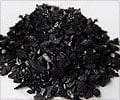A new study by Purdue University researchers has determined that earthworms can change the chemical nature of the carbon in forest litter and soils, potentially affecting the amount of carbon stored in forests.
The Purdue scientists, along with collaborators from the Smithsonian Institution and Johns Hopkins University, studied the habits of earthworms originally brought to North America from Europe, to determine their effect on forest chemistry by comparing carbon composition in forests that vary in earthworm activity.Some earthworms eat fallen leaves and other plant material - the litter of the forest floor - while others eat roots or soil organic matter.
This begins a decomposition process in which organic materials pass through the animals' digestive tracts and back into the soil.
The research team found that forests with greater numbers of invasive earthworms tend to have litter and soil organic matter enriched in the plant material lignin, which is typically harder for bacteria to decompose, according to Purdue biogeochemist Timothy Filley.
Sites with low numbers of these earthworms accumulate plant carbon in forms more easily degraded by bacteria.
Overall, the amount of carbon in the litter and duff layer, which is the surface mat of decaying organic matter and roots, decreases because of earthworm activity. However, the change in carbon chemistry may make it harder for soil organisms to decompose the carbon remains.
Advertisement
In some areas of the forest, more than 350 worms can be found in one square meter.
Advertisement
In contrast, sites that have no earthworms have many years of accumulated litter and organic matter above the soil.
This has implications for plant seed germination, water holding capacity and infiltration of the forest floor, among other things.
"The earthworms fundamentally change how the microbial community is decomposing," Filley said. "When they eat roots, they also eat other organisms that help to distribute nutrients between plants. Worms may throw off the timing of nutrient delivery," he added.
According to Filley, "Ultimately, we will look at such things to determine the potential invasive earthworms have in changing the flux of CO2 out of the forest and how much that could impact climate change."
Source-ANI
SPH











